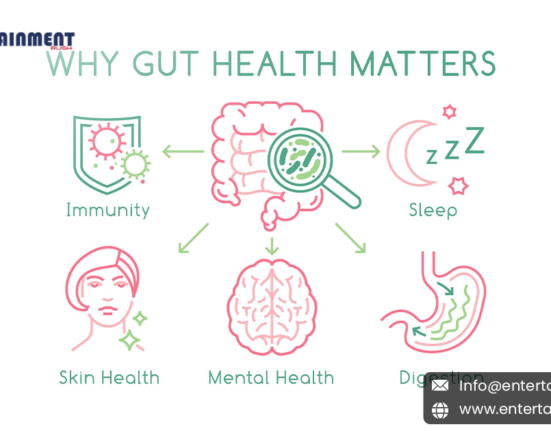In recent years, scientific research has increasingly highlighted the intricate relationship between gut health and mental wellness, shedding light on the profound impact of the gut-brain axis on overall health. In the United States, where issues of mental health and digestive disorders are prevalent, understanding and nurturing digestive harmony has emerged as a key focus for promoting holistic well-being. In this blog, we will explore the complex interplay between gut health and mental wellness, examining the latest research findings, practical strategies for optimizing digestive health, and their implications for promoting mental wellness in the USA.
The Gut-Brain Axis: A Bidirectional Communication System
The gut-brain axis refers to the bidirectional communication network that connects the gastrointestinal tract (the gut) with the central nervous system (the brain). This complex communication system involves a variety of pathways, including the nervous system, immune system, and endocrine system, through which signals are transmitted between the gut and the brain. Emerging research suggests that disturbances in the gut microbiota, the community of microorganisms that inhabit the digestive tract, can influence brain function and behavior, while psychological stress and emotions can also impact gut function and microbial composition.
Gut Health and Mental Wellness: The Evidence
A growing body of scientific evidence supports the notion that gut health plays a crucial role in mental wellness. Studies have shown that alterations in the gut microbiota, known as dysbiosis, are associated with various mental health disorders, including depression, anxiety, and autism spectrum disorders. Conversely, interventions aimed at restoring gut microbial balance, such as probiotics, prebiotics, and dietary modifications, have been shown to improve symptoms of mood disorders and enhance overall emotional well-being. Additionally, research suggests that gut microbiota can influence brain function through the production of neurotransmitters, such as serotonin and dopamine, which play key roles in mood regulation and emotional resilience.
Practical Strategies for Promoting Digestive Harmony
Given the significant impact of gut health on mental wellness, adopting strategies to promote digestive harmony is essential for overall well-being. One key aspect of gut health is maintaining a diverse and balanced gut microbiota. This can be achieved through a diet rich in fiber, fermented foods and prebiotic and probiotic supplements, which provide essential nutrients and promote the growth of beneficial bacteria in the gut. Additionally, managing stress and practicing relaxation techniques, such as mindfulness meditation and deep breathing exercises, can help support digestive health by reducing inflammation and promoting gut motility.
The Role of Diet in Gut Health and Mental Wellness
Diet plays a central role in both gut health and mental wellness, as the foods we eat directly impact the composition and function of the gut microbiota. A diet high in processed foods, sugar, and unhealthy fats can disrupt the balance of gut bacteria and contribute to inflammation and digestive disorders, which in turn can negatively affect mood and cognitive function. Conversely, a diet rich in whole foods, fruits, vegetables, and lean proteins provides essential nutrients and promotes a healthy gut microbiota, leading to improved mental clarity, mood stability, and overall well-being.
Addressing Digestive Disorders and Mental Health Conditions
For individuals struggling with digestive disorders or mental health conditions, addressing gut health can be a key component of treatment and recovery. Integrative approaches that combine conventional medical interventions with lifestyle modifications, dietary changes, and complementary therapies, such as acupuncture, herbal medicine, and mind-body practices, offer holistic solutions for promoting digestive harmony and mental wellness. Additionally, collaborative care models that involve multidisciplinary teams of healthcare providers, including gastroenterologists, psychiatrists, nutritionists, and therapists, can ensure comprehensive and personalized care for individuals with complex health needs.
The Impact of Environmental Factors on Gut Health and Mental Wellness
In addition to dietary factors, environmental exposures, such as pollutants, toxins, and medications, can also influence gut health and mental wellness. Environmental toxins, such as pesticides, heavy metals, and air pollutants, can disrupt the gut microbiota and contribute to inflammation and oxidative stress, which are implicated in the development of digestive disorders and mental health conditions. Similarly, certain medications, such as antibiotics, nonsteroidal anti-inflammatory drugs (NSAIDs), and proton pump inhibitors (PPIs), can alter the gut microbial balance and increase the risk of gastrointestinal symptoms and mood disturbances.
Cultivating Digestive Harmony for Mental Wellness
The connection between gut health and mental wellness underscores the importance of cultivating digestive harmony for overall well-being. By nurturing a healthy gut microbiota through diet, lifestyle, and environmental modifications, individuals can support optimal brain function, mood stability, and emotional resilience. Moreover, addressing digestive disorders and mental health conditions in a holistic and integrative manner can promote healing and recovery while enhancing overall quality of life. As awareness of the gut-brain axis continues to grow, so too does the potential to harness its therapeutic power for the benefit of individuals and communities across the United States.





Leave feedback about this